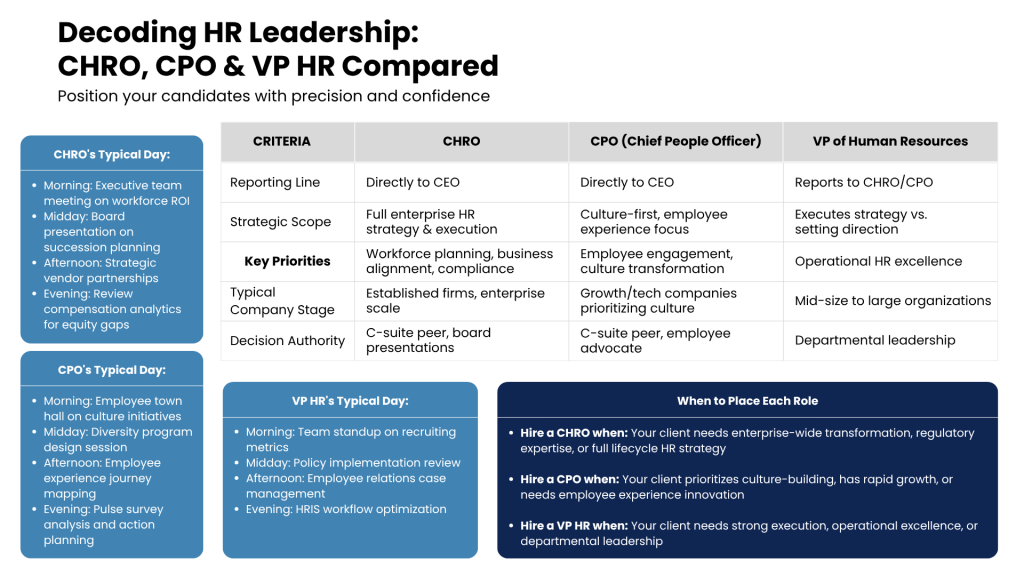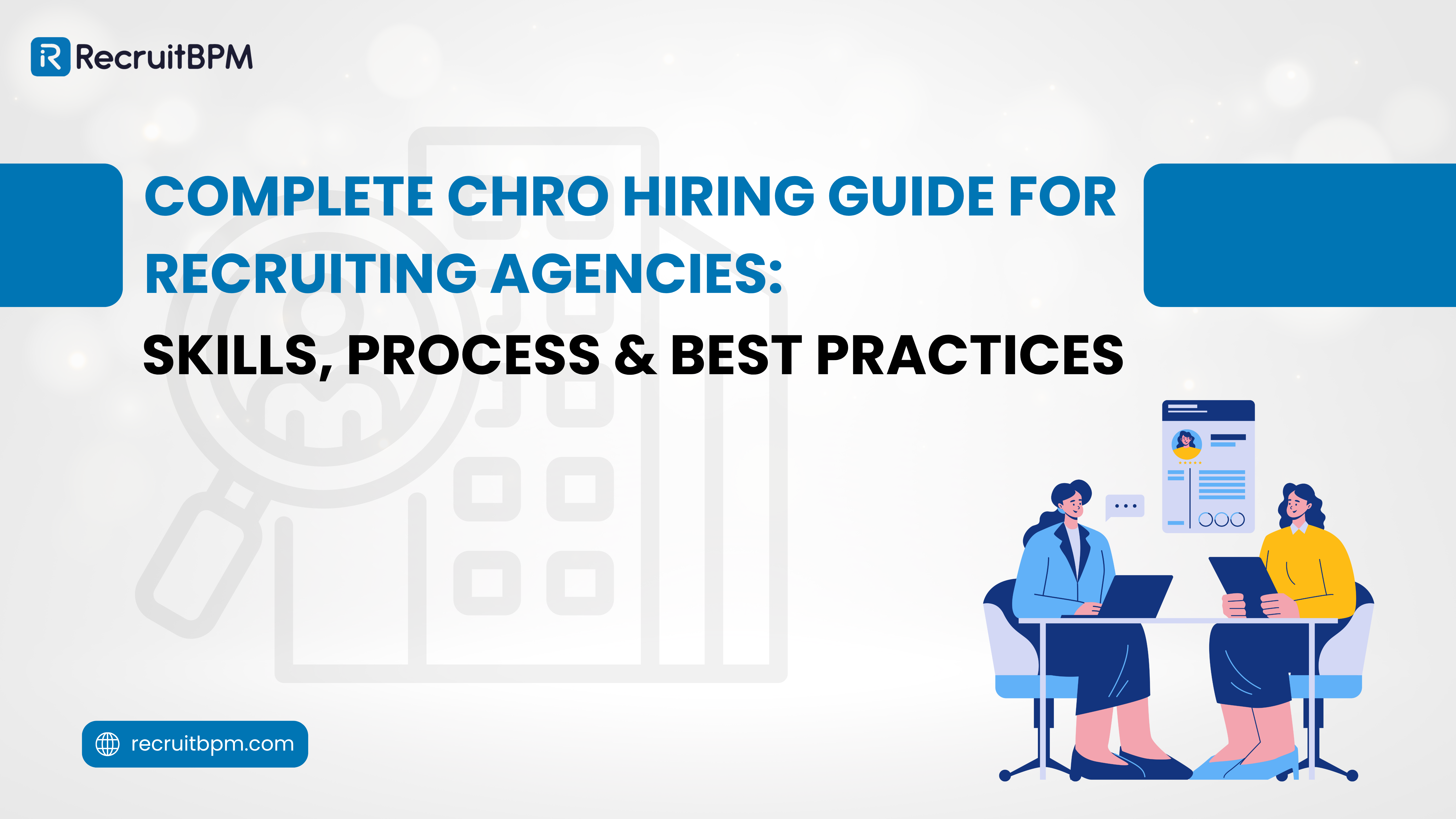Chief Human Resources Officers represent more than traditional HR leadership. They’re strategic architects who transform talent into competitive advantage. For recruiting agencies, mastering CHRO placements opens doors to high-value executive search opportunities.
This guide equips you with proven strategies to source, evaluate, and place exceptional CHRO talent.
Why CHROs Matter More Than Ever for Your Clients?
The Strategic Value of CHRO Placements
Organizations now recognize that their workforce drives bottom-line results. CHROs bridge people strategy with business objectives, making them indispensable C-suite partners. They architect culture, navigate regulatory complexity, and optimize human capital investments.
Your clients need CHROs who understand balance sheets, speak the language of executives, and translate business goals into talent initiatives. This strategic role helps organizations manage their most important asset: employees.
When you place the right CHRO, you’re delivering transformational leadership. This creates lasting client relationships and positions your agency as a trusted executive search partner.
When Organizations Need a Chief Human Resources Officer?
Companies typically seek CHRO talent during critical inflection points. Growth-stage companies need CHROs after achieving product-market fit when organizational structure becomes more complex and culture more difficult to maintain.
Your clients require CHRO expertise when they’re expanding headcount strategically, navigating mergers or acquisitions, or implementing workforce transformation. CHROs prove invaluable when companies face talent shortages, helping align corporate culture with staff needs.
International expansion, compliance challenges, and culture-building initiatives also signal CHRO hiring needs. Recognizing these trigger points helps you proactively approach clients with executive search solutions.
Understanding the CHRO Role and Responsibilities
Core Functions Every CHRO Must Master
Chief Human Resources Officers own the complete employee lifecycle. They oversee every aspect from sourcing talent to initial recruitment to disengagement, collaborating with senior leaders to develop company growth strategies.
Strategic workforce planning sits at the heart of CHRO responsibilities. They forecast talent needs, identify skills gaps, and build pipelines that support business expansion.
Talent acquisition strategy extends beyond filling positions. CHROs architect employer brand, design candidate experience, and ensure hiring practices reflect company values while meeting growth targets.
CHROs develop comprehensive strategies aligning human resources needs with broader company goals and objectives. They advise leadership boards on how decisions impact workforce dynamics and employee engagement.
CHRO vs CPO vs VP of HR: Key Distinctions

Understanding title nuances helps you position candidates appropriately. Chief Human Resources Officers typically hold the most senior HR position, reporting directly to CEOs.
Chief People Officers (CPOs) often emphasize culture and employee experience. The title reflects companies prioritizing human-centered approaches over traditional HR administration.
Vice Presidents of Human Resources usually operate one level below the CHRO or CPO. They execute a strategy rather than setting organizational direction.
Context matters when evaluating these roles. Some organizations use titles interchangeably, while others maintain distinct hierarchies. Clarify scope and reporting structure with clients before launching searches.
Day-to-Day Responsibilities That Define Success
CHROs balance strategic planning with operational oversight. They partner with executives on workforce planning, succession strategies, and organizational design.
They shape recruitment processes and develop strategies to improve engagement among current staff members. Managing the employee experience from onboarding through retirement requires systems thinking and empathetic leadership.
Compensation and benefits strategy demands market awareness. CHROs ensure compensation strategy aligns with industry trends while complying with pay equity laws.
Regulatory compliance protects organizations from legal exposure. CHROs stay current on employment law, implement best practices, and prepare companies for evolving requirements.
Essential Skills and Qualifications to Evaluate
Strategic Business Acumen and Leadership
Business acumen represents one of four core competencies vital for present and future HR success. CHROs must read financial statements, understand P&L dynamics, and connect talent investments to business outcomes.
Strong candidates demonstrate how they’ve influenced strategic decisions beyond HR. They articulate clear connections between workforce initiatives and revenue growth, operational efficiency, or market expansion.
Leadership excellence emerges through proven results. You won’t land an executive-level role without a clear history of leadership excellence. Look for candidates who’ve built high-performing teams and earned respect as executive peers.
Technical Competencies and HR Technology Proficiency
Modern CHROs navigate sophisticated technology ecosystems. HR departments rely on advanced systems to manage employees, run payroll, and analyze employee data.
Candidates should demonstrate competence with HRIS platforms, applicant tracking systems, and workforce analytics tools. They must develop strategies leveraging HR data for strategic decision-making.
Modern HR departments understand the importance of HR analytics, with 97 percent of HR professionals collecting at least some HR data. Evaluate how candidates have used data to drive organizational improvements.
Platforms like RecruitBPM’s integrated ATS and CRM enable CHROs to streamline talent acquisition. Strong candidates recognize how unified systems eliminate inefficiencies and improve candidate experience.
Emotional Intelligence and Communication Excellence
CHROs must have great communication and interpersonal skills, requiring high emotional intelligence. They navigate sensitive conversations, mediate conflicts, and influence stakeholders at every level.
The best CHROs read organizational dynamics intuitively. They understand political undercurrents, build coalitions, and advance initiatives through relationship-building rather than positional authority.
One of the most important qualities to look for in a CHRO is the ability to influence others from behind the scenes. They’re unconcerned with credit for great ideas, posing the right questions to guide decision-making.
Data Literacy and People Analytics Expertise
CHROs should understand HR analytics, including how data is gathered and how potential problems in analytics processes can be solved. They translate metrics into actionable insights for executive audiences.
Strong candidates demonstrate experience with predictive analytics, workforce modeling, and metrics-driven decision frameworks. They’ve used data to forecast turnover, identify high performers, and optimize talent investments.
Look for candidates who can articulate which metrics matter most. Quality of hire, time to productivity, retention rates, and employee engagement scores all provide strategic insights when analyzed properly.
Building the Ideal CHRO Candidate Profile
Educational Background and Professional Certifications
Bachelor’s or master’s degrees in relevant fields such as human resources, business administration, psychology, organizational development, or labor relations are typically required for CHRO positions.
MBA credentials signal business fluency and strategic capability. In order to obtain advanced executive job titles, you’ll need an advanced degree, which helps improve your chances of CHRO placement.
More than 55 percent of CHROs have HR certification, with 34 percent of HR professionals having at least one certification. SHRM-CP, SHRM-SCP, or PHR certifications demonstrate commitment to professional development.
Advanced certifications aren’t always mandatory. Some exceptional candidates bring cross-functional experience from operations, finance, or general management that enriches their HR perspective.
Industry-Specific Experience Requirements
If you run a company in a particularly complex context, like a consumer company operating in a regulated industry, you’ll likely want someone who has experience navigating those regulations.
Healthcare organizations need CHROs to understand HIPAA compliance. Financial services require knowledge of regulatory frameworks. Technology companies benefit from leaders who’ve scaled startups through hypergrowth phases.
Generally, it’s helpful to look for someone who has experience scaling headcount to where you want yours to be in 24 to 36 months. This ensures candidates have navigated challenges your client will face.
Critical Competencies for 2025 and Beyond
Digital proficiency separates good CHROs from exceptional ones. Leaders must champion HR technology adoption, implement AI-driven solutions, and prepare workforces for automation’s impact.
Many executive-level employees are tasked with driving change, and CHROs are responsible for communicating change to the wider organization. Change management expertise proves essential as companies navigate transformation.
Remote and hybrid workforce management requires new approaches. CHROs must design policies supporting distributed teams, maintain culture across geographies, and ensure equity between office and remote employees.
The Complete CHRO Recruitment Process
Defining Client Needs and Role Requirements
Start every CHRO search by understanding your client’s strategic context. What business challenges does this hire need to address? Which HR functions require immediate attention?
As a team, you must identify the main HR issues you perceive and how they might need to change to help your business go into its next phase.
Document specific pain points, whether restructuring costs, rapid expansion, efficiency improvements, or turnover reduction. These inform candidate evaluation criteria and help you pattern-match the right experience.
Collaborate with clients to create mission-outcomes-competencies documents. Define the mission this CHRO fulfills, the outcomes they must deliver, and the competencies required for success.
Sourcing Strategies for Executive-Level HR Talent
Executive search demands proactive outreach. Passive candidates dominate the CHRO talent pool. Sourcing the right Chief Human Resources Officer requires proactivity and patience.
LinkedIn remains invaluable for identifying HR leaders with relevant industry experience. Search for candidates currently holding VP HR, SVP HR, or divisional CHRO roles at companies one size larger than your client.
Attend human resources conferences and industry events to build professional networks, search for leads, and meet potential candidates. Events like the SHRM Annual Conference or HR Tech connect you with active practitioners.
Your existing network provides warm introductions. Ask current CHROs who they’d recommend for specific challenges. Strong executives typically know their peer group well.
Leveraging Your Network and Professional Communities
Build relationships before you need them. Maintain ongoing dialogue with HR executives even when you’re not actively recruiting them. Share industry insights, make introductions, and provide value.
Executive search firms specializing in HR placements can complement your efforts. Recruiting agencies are especially helpful at finding candidates with specific qualities.
Join HR leadership communities and professional associations. Participate in discussions, contribute expertise, and position yourself as a trusted resource. This visibility attracts candidates when they’re ready to explore opportunities.
Crafting Compelling CHRO Job Descriptions
Effective CHRO job descriptions balance aspirational vision with practical requirements. Lead with your client’s mission and growth trajectory to capture strategic candidates’ attention.
Emphasize business impact over administrative duties. Describe how this CHRO will influence company direction, scale operations, or drive transformation.
Include specific challenges they’ll tackle. “Lead talent acquisition strategy supporting 40 percent annual growth” resonates more than “oversee recruiting.” Concrete goals attract results-oriented leaders.
Highlight the company culture, values, and what makes this opportunity distinctive. Executive candidates evaluate cultural fit as carefully as you do.
Screening and Assessment Best Practices
Conducting Effective CHRO Interviews
Structure interviews to evaluate both technical expertise and leadership presence. The interview should focus on skills and experience, asking candidates to outline particular episodes and achievements.
Behavioral questions reveal how candidates approach complex situations. “Describe how you navigated a workforce reduction while maintaining organizational trust” uncovers judgment and emotional intelligence.
It’s critical that your candidate explain in great detail how they scaled the HR function and headcount in previous roles. Look for hands-on builders who’ve created systems from scratch.
Present realistic scenarios that your client faces. How would they approach international expansion? What’s their 90-day plan for diagnosing organizational health?
Key Interview Questions That Reveal True Capability
Ask candidates to describe their relationship with their last CFO and CEO. Strong answers demonstrate cross-functional collaboration and business partnership.
“Walk me through your approach to developing data-driven workforce insights” assesses analytical capability. Listen for specific methodologies, tools used, and business outcomes achieved.
Because CHROs must have a comprehensive understanding of your company to do their job well, they must show up to the interview process like owners. Watch whether candidates ask strategic questions about business model, competitive landscape, and financial plans.
“How do you balance employee advocacy with business pragmatism?” reveals their philosophy. Great CHROs serve both constituencies without compromising either.
Evaluating Cultural Fit and Leadership Style
The best CHROs approach their roles collaboratively and understand that respect is earned, not given. They build credibility through small wins while gaining context and forging stakeholder relationships.
Red flags emerge when candidates arrive with prescriptive answers before understanding the organizational context. It can be a red flag when a CHRO comes in with prescriptive takes about what needs to change before spending time with your team.
Assess humility alongside confidence. Strong executives acknowledge what they don’t know and describe how they’d complement their skills through strategic hiring.
Look for customer service orientation. Great CHROs operate in customer service mode, developing strong relationships with executives to understand what each part of the company wants from HR.
Reference Checks That Provide Real Insights
It can be difficult to gauge if your candidate has built a trustworthy HR program during interviews, so it’s particularly important to consult your CHRO candidate’s references.
Speak with former executive peers to understand collaboration style. Ask how the candidate influenced decisions, handled conflict, and drove strategic initiatives.
Interview non-executive colleagues to assess HR program effectiveness. If the candidate’s colleagues immediately contacted HR when they had a problem, that signals they valued HR’s insights.
Ask about the CHRO’s legacy. What systems, programs, or cultural elements persisted after their departure? This reveals sustainable impact versus superficial initiatives.
Balancing Generalist Experience with Specialized Skills
When we’ve counseled companies on hiring a CHRO, we’ve generally found that great CHROs have experience both as generalists and business partners. They develop fluency in all HR aspects and roll up their sleeves to build scalable programs.
No CHRO excels at every function. Identify your one to two most critical HR issues and look for candidates who have demonstrated expertise in those areas.
Strong candidates recognize their development areas. Your candidate should also recognize where they aren’t strong and will need to hire others to complement their skill set.
Identifying Behind-the-Scenes Influencers
The most effective CHROs work quietly behind the scenes. They’re unconcerned with getting credit for great ideas, and they know how to pose the right questions to the right people to guide decision-making.
Assess whether candidates seek visibility or results. Ask about accomplishments they’re proud of that others might not know they drove. Strong leaders often credit their teams while downplaying personal contributions.
Avoiding the Recruiter-to-CHRO Transition Pitfall
Recruiters, on the other hand, don’t always make the best CHROs because the best recruiters are often great salespeople, and salespeople tend to want their time in the spotlight.
When done well, HR is a very low-profile endeavor, and recruiters who thrive in the limelight might struggle to work behind the scenes.
Exceptional recruiters might transition successfully if they demonstrate strategic thinking beyond talent acquisition. Evaluate their experience with comprehensive HR functions, including employee relations, compensation strategy, and organizational development.
Salary Benchmarks and Compensation Strategies
Current CHRO Salary Ranges by Industry
The US average for a Chief Human Resource Officer is $256,400 according to Salary.com, while the reported average salary on Payscale.com amounts to $151,200. This variation reflects differences in company size, industry, and geographic location.
Ninety percent of talent acquisition managers earn up to $382,100, with 75 percent receiving less than $322,200. Technology, finance, and healthcare typically offer premium compensation.
Location significantly impacts salary ranges. Major metropolitan markets command higher compensation. Companies in competitive talent markets must adjust offers accordingly.
Compensation Beyond Base Salary
Equity participation attracts top CHRO candidates to growth companies. Meaningful ownership stakes align executive interests with long-term company success.
Performance bonuses tied to strategic metrics demonstrate compensation philosophy. Structure incentives around retention rates, employee engagement scores, or successful scaling milestones.
Comprehensive benefits packages matter increasingly to executive candidates. Flexible work arrangements, professional development budgets, and wellness programs enhance total compensation value.
Negotiating Competitive Packages
You should be prepared to negotiate because top candidates know their worth. Research comparable roles at similar organizations to establish reasonable ranges.
Present compensation as an investment rather than a cost. Exceptional CHROs deliver returns through improved retention, optimized workforce productivity, and strategic talent deployment.
Consider creative compensation structures for budget-constrained clients. Deferred compensation, enhanced equity, or performance accelerators can bridge gaps when base salary falls short.
Supporting Client Success Through Onboarding
First 90 Days Framework for New CHROs
A structured onboarding plan helps your new CHRO build credibility and deliver impact quickly. Pre-start preparation includes sharing strategic plans, HR metrics, and organizational charts.
The first 30 days focus on relationship building. Schedule meetings with the C-suite and HR team while immersing the CHRO in culture through onboarding sessions.
Days 31 through 60 involve a comprehensive assessment. Conduct a full review of HR policies, DEI initiatives, and compliance frameworks while identifying quick wins.
The 60 to 90-day period shifts to strategic planning. Develop a strategic roadmap aligned with business goals and present early insights to the board.
Setting Your Client’s CHRO Up for Long-Term Success
Stay engaged beyond placement. Check in regularly during the first six months to address challenges, provide support, and gather feedback.
Help CHROs build external networks. Introduce them to peer executives, industry groups, and professional communities. Strong networks accelerate learning and provide a valuable perspective.
Position yourself as an ongoing talent advisor. As CHROs build their teams, you become their trusted partner for director, VP, and manager-level placements.
How RecruitBPM Streamlines CHRO Placements?
End-to-End Talent Pipeline Management
RecruitBPM’s integrated ATS and CRM consolidate executive search workflows. Track candidate relationships, document interactions, and manage complex search processes without switching between platforms.
Build dedicated CHRO talent pipelines years before clients need placements. Maintain warm relationships with executive candidates, sharing market insights and career guidance that positions you as a trusted advisor.
Customizable fields capture the specialized data executive searches require. Document leadership competencies, board experience, industry expertise, and cultural fit factors that matter for CHRO placements.
AI-Driven Candidate Matching and Assessment
RecruitBPM’s AI capabilities accelerate candidate identification. Parse resumes automatically, extract relevant experience, and match candidates against complex requirement profiles.
Reduce time-to-hire for executive placements through intelligent candidate ranking. The system highlights the strongest matches based on your specified criteria, focusing your attention on the highest-potential candidates.
Automated workflows ensure no candidate falls through the cracks. Set reminders for follow-ups, trigger communications at key milestones, and maintain consistent candidate experience throughout lengthy search processes.
Customizable Workflows for Executive Search
Design workflows reflecting your CHRO search methodology. Map stages from initial client engagement through candidate presentation, interview coordination, offer negotiation, and onboarding support.
Collaboration features enable team-based executive search. Share candidate evaluations, collect interview feedback, and make collective decisions within a unified platform.
Reporting and analytics demonstrate your value to clients. Track time-to-fill, candidate quality metrics, and placement success rates. Use data to refine your approach and win repeat business.
RecruitBPM scales from boutique executive search firms to large recruiting organizations. Whether you’re placing one CHRO annually or building a specialized HR executive practice, the platform adapts to your needs.
Ready to elevate your executive search capabilities? RecruitBPM provides the technology infrastructure recruiting agencies need to compete for high-value CHRO placements. Our AI-driven platform, customizable workflows, and end-to-end talent management tools help you deliver exceptional results for clients.
Discover how RecruitBPM can transform your CHRO recruitment process. Schedule your demo today.

















